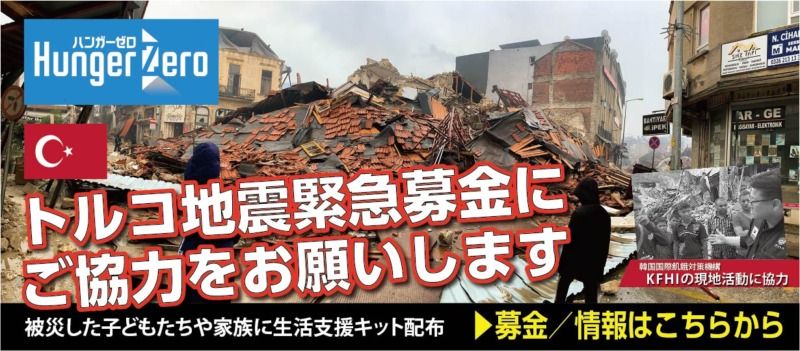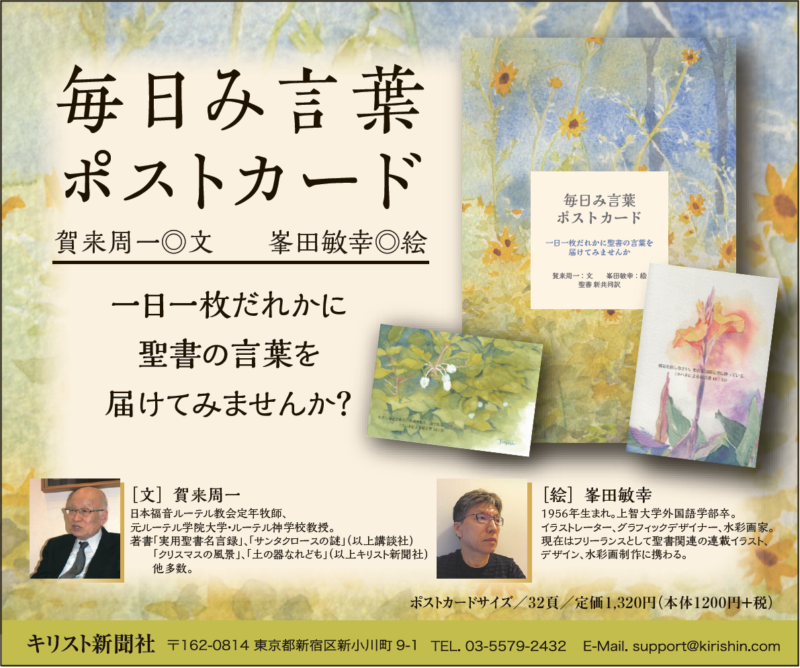政治的分断に加えて、世代間の差もある。調査国中10カ国で、宗教の役割が増すことに好意的な人は、18歳から29歳までより、50歳以上が格段に多い。
In addition to the political divide, there is also an age gap between those supportive of a more important role for religion. In 10 of the countries surveyed, older adults (over the age of 50) favor an increased role for religion at notably higher rates than younger adults (between 18 and 29).
ミサの出席率が減少しているイタリアでは、年配の世代と若い世代では、25%と最も大きな差がある。米国では、その差は22%だ。
Italy, where Mass attendance is in decline, features the biggest difference, with a 25 percentage-point gap between older and younger Italians. In the US, the gap is 22 percentage points.
フィリピンでは反対に、宗教の果たす役割が大きくなることに肯定的な人は、親の世代に比べて若い世代のほうが15%多い。
Bucking the trend, however, is the Philippines, where young adults are actually more in favor of an increased role for religion by 15 percentage points over their parents’ generation.
宗教の役割が増すことに否定的な人は、米国や世界において少数派である一方、「宗教の重要性が低下している」と信じる人はきわめて多い。
While a minority of people in the US and around the world voice opposition to an increased role for religion in society, considerably more believe the importance of religion in their countries is indeed on the decline.
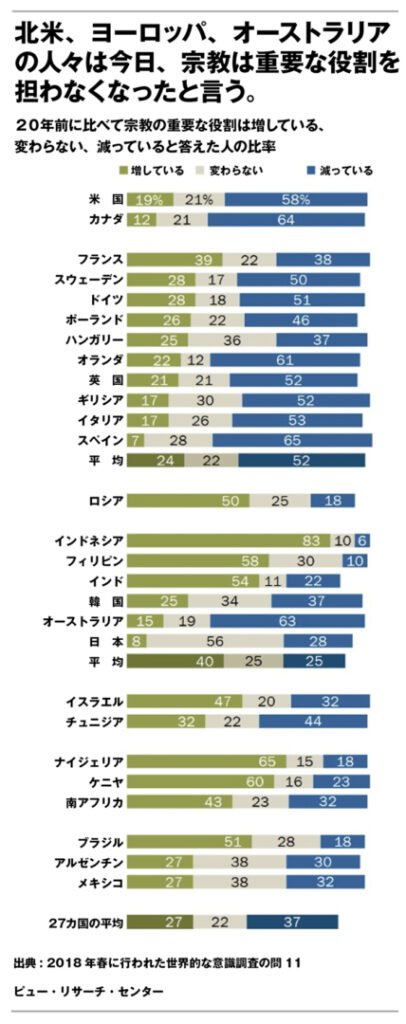
「宗教が果たす役割は20年前に比べて低下している」と答えたのは37%に対し、「増している」と答えたのは回答者の27%だ(約5人に1人は「変わらない」と答えた)。
A median of 37 percent say religion plays a less important role in their countries today than it did 20 years ago, while 27 percent of respondents say religion now plays a more important role. (About 1 in 5 say there has been no change.)
過去20年間に宗教の重要性が増したか低下したかについては、国ごとに見方が大きく異なる。たとえば、「重要性が増した」と答えたのはスペインで7%、日本では8%と、ほんの一部の人だ。反対に、イスラム教徒が多数を占めるインドネシアでは、83%が「増している」と答えた。
Countries around the world differ sharply in the perceived rise or fall of the importance of religion in the last two decades. For instance, only a fraction of the populations of Spain (7%) and Japan (8%) say religion has grown in importance. The trend is the reverse in Muslim-majority Indonesia where, as noted above, 83 percent of people agree that religion has taken on new importance in society.
近ごろ、インドネシアで行われた選挙は、そのことを端的に示している。ジョコ・ウィドド(ジョコウィ)大統領が、76歳のイスラム教の聖職者(モハマッド・ユスフ・カラ副大統領)を片腕として2期目の任期に入ることが決まったのだ。インドネシアは、政治的にも宗教的にも保守主義が強まっている国で、人口は世界第4位(約2億6000万人)。クリスチャンであるジャカルタ州の前知事バスキ・プルナマ(通称アホック)氏がつい最近、宗教冒とく罪(知事選期間中にイスラム教の聖典クルアーンの一節に触れた)による2年間の刑期を終えて出所したばかりだ。
The recent Indonesian election proves the point, as first results appear to have returned President Joko “Jokowi” Widodo to another term in power, this time with a 76-year-old Muslim cleric as his running mate. Political and religious conservatism is on the rise in the Southeast Asian nation, the fourth-most populous country in the world, where the Christian former governor of Jakarta, popularly known as Ahok, was only recently released from prison after serving a two-year prison sentence on charges of blasphemy.
「20年前よりも、宗教が生活や社会に及ぼす影響が増している」と考える回答者は、グローバル・サウスでは、ナイジェリア(65%)やインド(54%)と同様、フィリピンに多い(59%)。とりわけ、これらの国の大多数が、「宗教は自分の人生にとって非常に重要だ」と答えている。
Also in the Global South, large percentages of respondents in the Philippines (58%), as well as Nigeria (65%) and India (54%) noted above, believe religion impacts their lives and societies more now than it did two decades ago. Notably, strong majorities in each of these countries also say religion is very important in their personal lives.
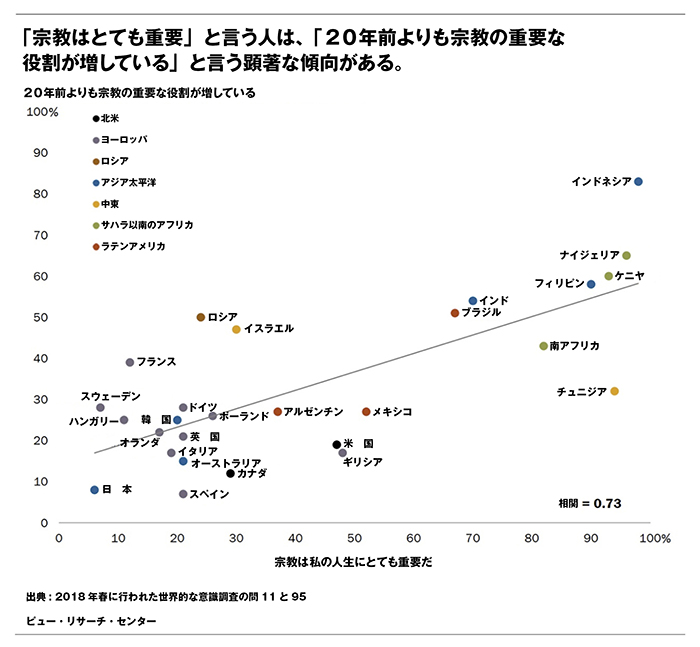
「『宗教が社会に果たすべき役割は増している』と考える人と、『宗教が自分の人生にとって重要だ』と答える人は強い相関関係にある」と調査担当者は言う。
“There is a strong correlation between those who see religion’s role in society growing and those who think religion is very important in their lives,” state the study’s authors.
西に目を向けると、北米やヨーロッパでは、「宗教が社会に果たす役割は過去20年間で減少した」と答える傾向が強い。米国ではほぼ10人に6人(58%)が、「自国において宗教が果たすべき重要性は、21世紀初頭よりも減じている」と答えた。ヨーロッパでも約半数(52%)が同様に答えている。
In the West, people in North America and Europe are very likely to say religion’s role in society has diminished in the last 20 years. In the US, nearly 6 in 10 (58%) say religion plays a less important role in the country than it did at the turn of the century. About half of Europeans (52%) say the same of their own countries.
「過去20年間で多様性や男女同権が進んだ一方、家族の結びつきは非常に弱くなった」と考えている人が多いことが調査では明らかになった。およそ5人に1人は、こういった面に変化はないと考えている。宗教に関する質問よりも、ここでは意見の相違は少なかった。
The study also found that most people believe diversity and gender equality have increased in their nations over the past 20 years while family ties have weakened significantly. About 1 in 5 believe there has been no change on these aspects of society. Opinions were less divided than on the religion questions.
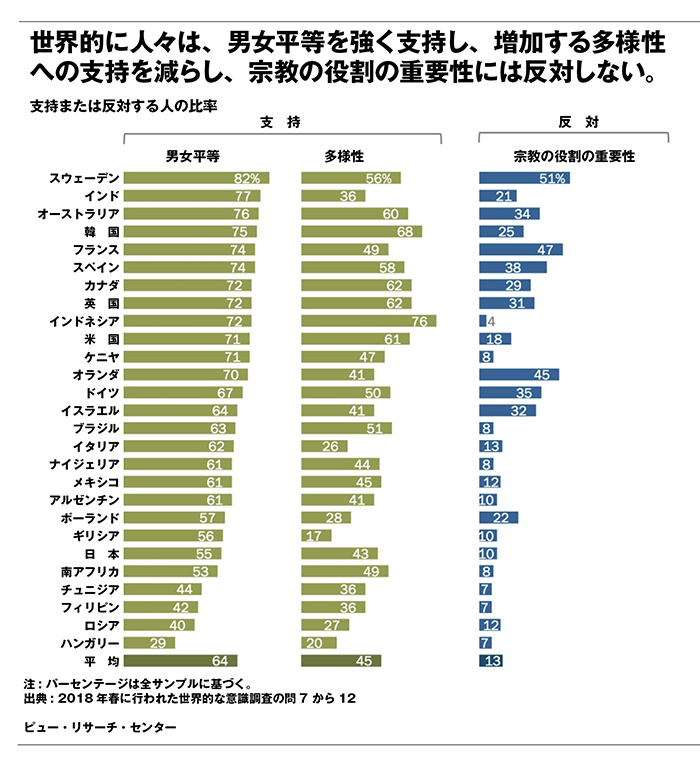
「男女同権が進んだことには非常に肯定的ですが、民族的・宗教的・人種的多様性が増すことに対しては、それほど熱心な興味を示していません。そして、世俗化の傾向があるにもかかわらず、調査した27カ国では、社会に対して宗教の役割が増すことに反対ではないのです」とピュー・リサーチ・センターの調査員は結論づけた。
Pew researchers concluded that “people are strongly in favor of increased gender equality but share more tepid enthusiasm for increased ethnic, religious, and racial diversity. And despite secularization trends, most across the 27 countries surveyed do not oppose a more important role for religion in their society.”
調査は、米国、カナダ、オランダ、英国、スペイン、フランス、ドイツ、スウェーデン、ハンガリー、ギリシア、ポーランド、イタリア、ロシア、インドネシア、フィリピン、インド、オーストラリア、韓国、日本、イスラエル、チュニジア、ナイジェリア、ケニヤ、南アフリカ、メキシコ、アルゼンチン、ブラジルの各国で行われた。
Countries surveyed include the United States, Canada, the Netherlands, the United Kingdom, Spain, France, Germany, Sweden, Hungary, Greece, Poland, Italy, Russia, Indonesia, the Philippines, India, Australia, South Korea, Japan, Israel, Tunisia, Nigeria, Kenya, South Africa, Mexico, Argentina, and Brazil.
執筆:グリフィン・ポール・ジャクソン
本記事は「クリスチャニティー・トゥデイ」(米国)より翻訳、転載しました。翻訳にあたって、多少の省略をしています。
出典URL:https://www.christianitytoday.com/news/2019/april/pew-global-importance-religion-diversity-gender-family.html
「クリスチャニティー・トゥデイ」(Christianity Today)は、1956年に伝道者ビリー・グラハムと編集長カール・ヘンリーにより創刊された、クリスチャンのための定期刊行物。96年、ウェブサイトが開設されて記事掲載が始められた。雑誌は今、500万以上のクリスチャン指導者に毎月届けられ、オンラインの購読者は1000万に上る。
関連




